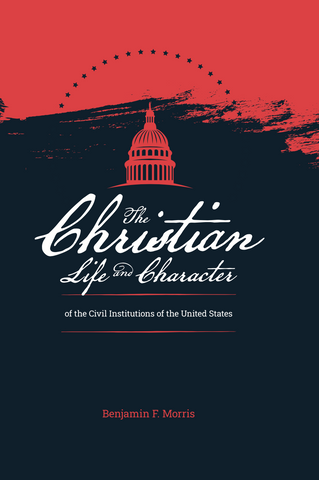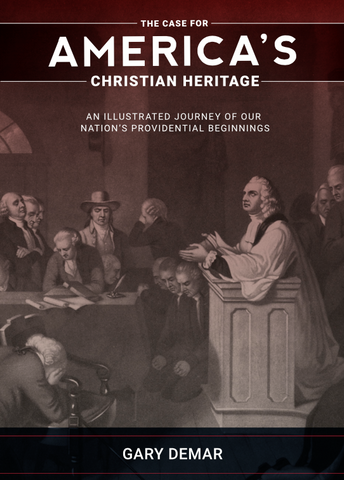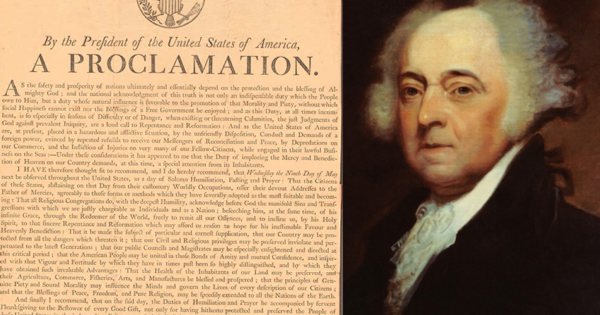American Vision runs ads on Facebook for several products. The topic of America’s Christian history and heritage gets the most vitriolic response. It’s obvious that most of those who comment have a skewed version of history. This is not surprising given how our nation’s public schools (1) don’t mention America’s Christian background except the statement by Thomas Jefferson about the separation of church and state and/or (2) strictly forbid mentioning anything related to religion and history because of threats from the ACLU and the Freedom From Religion Foundation.
There is a long history of the relationship between the Christian religion and civil government in our nation. John Adams, representing Massachusetts, and George Washington, representing Virginia, were present at early congressional meetings.
On March 16, 1776, “by order of Congress” a “day of Humiliation, Fasting and Prayer” where people of the nation were called on to “acknowledge the over ruling providence of God” and bewail their “manifold sins and transgressions, and, by a sincere repentance and amendment of life, appease his righteous displeasure, and, through the merits and mediation of Jesus Christ, obtain his pardon and forgiveness.”

The Christian Life and Character of the Civil Institutions of the United States
Reprinted by American Vision for the first time in over 140 years in 2007, we can't keep this book in print! It is already in it's tenth printing, again in a beautiful high-quality smythe-sewn hardback version with an updated cover and several formatting improvements. Don't miss out on the fantastic wealth of information this 1000+ page book has in store. Your children and grandchildren are not being taught the truth of history in public school, and this book will correct that travesty!
Buy NowCongress set aside December 18, 1777, as a day of thanksgiving so the American people “may express the grateful feelings of their hearts and consecrate themselves to the service of their divine benefactor” and on which they might “join the penitent confession of their manifold sins … that it may please God, through the merits of Jesus Christ, mercifully to forgive and blot them out of remembrance.”
Congress also recommended that Americans petition God “to prosper the means of religion for the promotion and enlargement of that kingdom which consists in righteousness, peace and joy in the Holy Ghost.”[1] Keep in mind that these two proclamations precede (1774) and follow (1777) the drafting of the Declaration of Independence (1776).
We find the following from Adams’ Diary dated July 26, 1796:
The Christian religion is, above all the Religions that ever prevailed or existed in ancient or modern Times, the Religion of Wisdom, Virtue, Equity, and humanity, let the Blackguard [Thomas] Paine say what he will; it is Resignation to God, it is Goodness itself to Man.[2]
Adams expressed his religious views on numerous occasions, but his call for a National Fast Day on March 6, 1799, is the most expressive. In it he described the Bible as “the Volume of Inspiration” and acknowledged “the growing providence of a Supreme Being and of the accountableness of men to Him as the searcher of hearts and righteous distributer of rewards and punishments.” The Proclamation recommended the following:
[That April 15, 1799] be observed throughout the United States of America as a day of solemn humiliation, fasting, and prayer; that the citizens on that day abstain, as far as may be, from their secular occupation, and devote the time to the sacred duties of religion, in public and in private; that they call to mind our numerous offenses against the most high God, confess them before Him with the sincerest penitence, implore his pardoning mercy, through the Great Mediator and Redeemer, for our past transgressions, and that through the grace of His Holy Spirit, we may be disposed and enabled to yield a more suitable obedience to his righteous requisitions in time to come; that He would interpose to arrest the progress of that impiety and licentiousness in principle and practice so offensive to Himself and so ruinous to mankind; that He would make us deeply sensible that “righteousness exalteth a nation, but sin is a reproach to any people [Proverbs 14:34].”[3]

The Case for America's Christian Heritage
There’s much work before us to reset the foundation stones of a firm reliance on Divine Providence. We need to heed the words of Benjamin Franklin who quoted Psalm 127:1 during the drafting process of the Constitution: “except the Lord build the house they labor in vain that build it,” and “that without His concurring aid we shall succeed in this political building no better, than the Builders of Babel.” The principles that were true and necessary centuries ago for building nations are equally true and necessary today. Let’s get to work!
Buy NowAdams had written to Thomas Jefferson about religion: “The general principles, on which the Fathers achieved independence, were … the general principles of Christianity”[4] and “Without religion this world would be something not fit to be mentioned in polite society, I mean hell.”[5]
Both men borrowed moral capital from Christianity to make their case for a just society. Neither man was an atheist, and if asked to teach in today’s public schools, they would be forbidden to state their religious beliefs or refer to the documents they drafted!
[1] The proclamation can also be seen in Gary DeMar, America’s Christian History (Powder Springs, GA: American Vision, 2005), 252.
[2] John Adams, The Diary and Autobiography of John Adams, ed. L.H. Butterfield (Cambridge, MA: The Belknap Press of Harvard University Press, 1962), 3:233-234.
[3] John Adams, “National Fast Day,” A Compilation of the Messages and Papers of the Presidents, 1:284-286.
[4] John Adams to Thomas Jefferson, June 28, 1813, in Lester J. Cappon, ed., The Adams-Jefferson Letters, 2 vols. (Chapel Hill, NC: University of North Carolina Press, 1959), 2:339-340.
[5] John Adams to Thomas Jefferson (April 19, 1817) in Thomas Jefferson, The Writings of Thomas Jefferson (Washington, DC: The Thomas Jefferson Memorial Association, 1904), 15:105.

